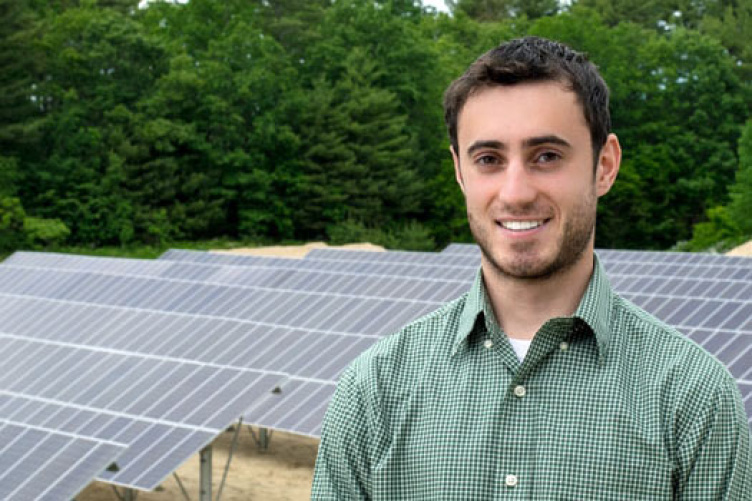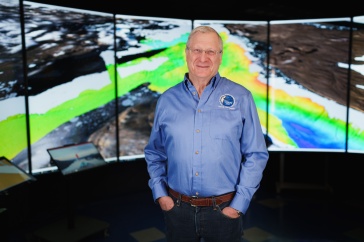
COLSA graduate student Henry Herndon recently received a Switzer Environmental Fellowship. Photo by Anthony Stewart
Water. Energy. Sustainability.
They’re in the headlines almost every week — and addressing these global issues is the basis for award-winning research by UNH graduate students.
In recent months, Christopher Whitney and Henry Herndon, both Master of Science degree students in COLSA’s natural resources graduate program, were honored with prestigious fellowships to support their work.
Whitney has received a Science To Achieve Results (STAR) Graduate Fellowship from the EPA, while Herndon was awarded a Switzer Environmental Fellowship.
STAR fellowships are part of a national effort to ensure the nation meets its human resource needs in environmental science, engineering, math and technology. Switzer fellowships recognize work on protecting the environment and leadership potential in the field.
STAR Fellowship

Whitney’s $132,000 STAR fellowship will fund research on safe and sustainable water resources.
“I didn’t believe it at first,” Whitney recalls of the day he learned he was a STAR recipient, adding, “After the realization that I really did receive a fellowship sank in, I was beyond excited.”
His award-winning project is titled Nitrogen Removal by Beaver Ponds in Nutrient Enriched Coastal Watersheds.
Using GIS to determine the abundance of beaver ponds in the Ipswich and Parker River watersheds, Whitney explains, he will measure nitrogen removal “using an approach that we have recently developed that combines in situ water quality sensors with experimental nitrogen additions” to determine the effect of beaver ponds and wetlands on nitrogen removal for the entire river network.
“I find that performing exciting research at UNH and collaborating with other researchers as well as members of the communities that we work in is very rewarding,” Whitney says. “However, research is only a part of what has made my graduate work rewarding. I have also been lucky enough to work with undergraduate students both as a teaching assistant as well as serving as a collaborator on their independent research projects. Helping to teach and inspire students in the sciences has been just as rewarding as the research I am performing here at UNH.”
Whitney’s fellowship proposal also included working with nontraditional students.
Starting his undergraduate college years at 25, he explains, “had its own challenges, and I almost didn’t stick with it, but I was inspired by some great people who helped me get to where I am today. That’s why I would like to do what I can to help students who are in a similar situation.”
Switzer Fellowship
Herndon’s $15,000 fellowship supports his work studying how states like New Hampshire and Massachusetts and countries like Germany create and implement energy policy for a modern, sustainable world.
Herndon’s research includes determining the stakeholders involved in designing policies that stimulate the growth of clean energy markets and how they collaborate to solve the challenges of evolving energy infrastructure. To do this, he is interviewing elected officials and representatives from utilities, regulatory agencies, state energy and environmental offices and advocacy groups.
“In today's context of increasing awareness of the impending consequences of unaddressed climate change alongside advancements in alternative energy technologies, our energy system is undergoing a rapid evolution,” he explains. “I hope that my research will contribute to a better understanding of that evolution so that the stakeholders involved can direct it in the most equitable, efficient and expedient manner.”
Find Your Fellowship
UNH’s office of national fellowships provides information, counsel and editorial support to motivated, high-achieving students applying for national and international fellowships and scholarships.
For more about opportunities like the Switzer/EPA-STAR fellowships, contact office director Jeanne Sokolowski at Jeanne.sokolowski@unh.edu or 603-862-0733.
Like Whitney, Herndon was thrilled to learn he had been selected for a fellowship.
“It feels good to receive affirmation that your passion is shared by a community of professionals who are willing to support you in achieving your goals,” he explains. “The Switzer Network is comprised of experts in everything from urban planning to business and finance to agriculture and food systems to countless other disciplines, all working to create a more sustainable society, and I am excited to join that community.”
And studying at UNH, he adds, has provided him with opportunities to connect with those working in New Hampshire's energy sector.
“I learn so much from the electric utility engineers, the solar entrepreneurs and the public servants that I engage with while conducting my research,” Herndon says, adding, “I would not have received this fellowship without the guidance of my three exceptional advisors at UNH — professors Catherine Ashcraft, Clay Mitchell and Stacy VanDeveer — or without the support of the Environmental Policy, Planning, and Sustainability Lab.”
Learn more about the advanced degree programs available at the UNH Graduate School.
-
Written By:
Jennifer Saunders | Communications and Public Affairs | jennifer.saunders@unh.edu | 603-862-3585
















































